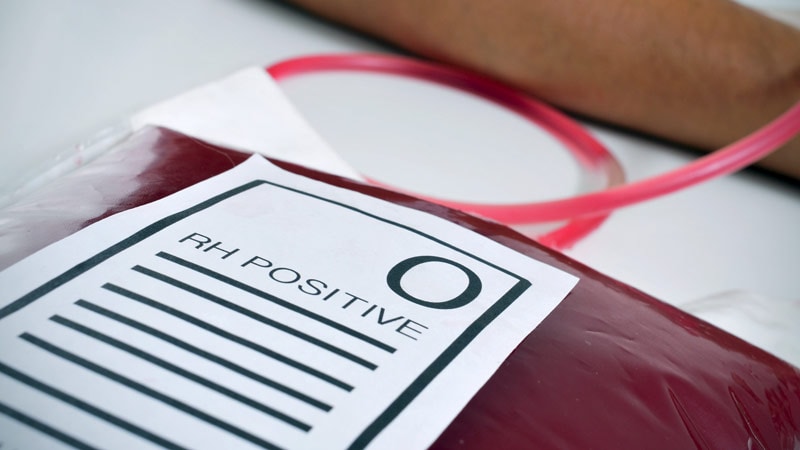
Editor's note: Find the latest COVID-19 news and guidance in Medscape's Coronavirus Resource Center.
Blood type is not a predictor of COVID-19 severity (death or intubation) or need for hospitalization, but it may be linked with testing positive for the disease, a new study has found.
Co-first authors Christopher A. Latz, MD, MPH, and Charles DeCarlo, MD, from the Division of Vascular and Endovascular Surgery at Massachusetts General Hospital (MGH) in Boston, and colleagues, published their findings online July 12 in Annals of Hematology.
The observational study analyzed data from 1289 symptomatic adults with COVID-19 and documented blood type.
Patient information came from the Research Patient Data Registry, a large repository spanning five Boston-area hospitals, including MGH and Brigham & Women's Hospital. Patients underwent treatment from March 6 to April 16.
Senior author Anahita Dua, MBChB, a vascular surgeon at MGH, told Medscape Medical News the study should put to rest one question surrounding COVID-19.
"Blood type does not relate to severity of disease in COVID," she said. However, other links between blood type and COVID-19 deserve further study, she added.
A study published in the New England Journal of Medicine found a link between genetic markers and COVID-19.
In that study, the researchers identified a particular gene cluster among patients with COVID-19 and respiratory failure "and confirmed a potential involvement of the ABO blood-group system."
That may be an area ripe for more research, Dua continued.
"It's not unheard of that a genetic difference in people would result in a different outcome with COVID," she explained.
Type O Phenomenon
Dua said one interesting finding in the current research was that symptomatic patients with COVID-19 and type O blood appeared to test positive at a significantly lower rate than patients who had types B or AB or a positive rhesus (Rh) factor.
Table. Odds of a Positive COVID-19 Test by Blood Type
| Blood type | Adjusted odds ratio | 95% CI |
|---|---|---|
| A | 1.00 | 0.88 - 1.13 |
| B | 1.28 | 1.08 - 1.52 |
| AB | 1.37 | 1.02 - 1.83 |
| O | 0.84 | 0.75 - 0.95 |
| Rh+ | 1.22 | 1.003 - 1.50 |
A previous study in a preprint, medRxiv, which was not peer reviewed, concluded that among hospitalized patients in China, type A blood was associated with a higher risk of developing COVID-19 compared with non-A blood groups. It also showed that type O was linked with a lower risk for the infection compared with non-O blood groups.
Latz and colleagues found no link with key clinical outcomes: hospital admission (P = .20), intensive care unit admission (P = .94), intubation (P = .93), required prone positioning while intubated (P = .58), required extracorporeal membrane oxygenation (P = .09), and death (P = .49).
There was also no link to increased inflammation depending on blood type with key markers including white blood cell count and C-reactive protein.
It would have been very interesting if patients with a certain blood type were not reacting with inflammatory signals when patients of another blood type were, Dua said. But the researchers found instead the same kind of inflammatory response.
Roy Silverstein, MD, professor and chair of medicine at the Medical College of Wisconsin, Division of Hematology and Oncology, in Milwaukee, told Medscape Medical News that none of these association studies should be considered conclusive but the study by Latz and colleagues seems to be the most robust of the COVID-19 blood type studies.
"These kinds of studies can never provide certainty," he said. "There are always potential biases."
He noted many blood type studies have used regular blood donors as a control, but that group has historically had an overrepresentation of type O because those universal donors are the ones blood banks most often solicit.
There is biologic plausibility of a link between disease properties and blood type — malaria is an example — and Silverstein said he would not rule out that blood type could play some role in understanding COVID-19. He encouraged further study.
"It might point to areas for biologists to do interesting research," he said.
But he added he would never tell someone with type O blood to be less cautious about wearing a mask, washing hands, or social distancing.
"We all need to be extra cautious," he said.
Marcia Frellick is a freelance journalist based in Chicago. She has previously written for the Chicago Tribune and Nurse.com and was an editor at the Chicago Sun-Times, the Cincinnati Enquirer, and the St. Cloud (Minnesota) Times. Follow her on Twitter at @mfrellick
The authors and Silverstein have disclosed no relevant financial relationships.
Ann Hematol. Published online July 12, 2020. Full text
Follow Medscape on Facebook, Twitter, Instagram, and YouTube.
"type" - Google News
July 21, 2020 at 10:49PM
https://ift.tt/32H1E1q
Blood Type Not Linked to COVID-19 Severity - Medscape
"type" - Google News
https://ift.tt/2WhN8Zg
https://ift.tt/2YrjQdq
Bagikan Berita Ini














0 Response to "Blood Type Not Linked to COVID-19 Severity - Medscape"
Post a Comment